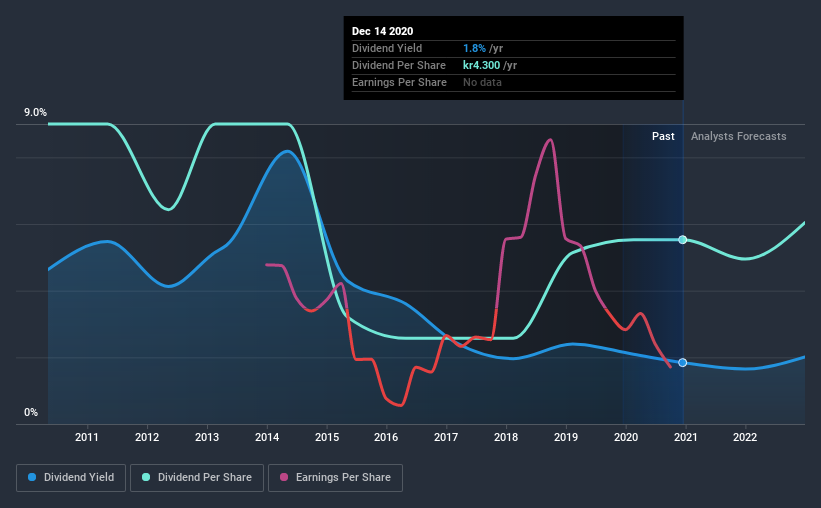- Norway
- /
- Industrials
- /
- OB:BONHR
Factors Income Investors Should Consider Before Adding Bonheur ASA (OB:BONHR) To Their Portfolio

Could Bonheur ASA (OB:BONHR) be an attractive dividend share to own for the long haul? Investors are often drawn to strong companies with the idea of reinvesting the dividends. On the other hand, investors have been known to buy a stock because of its yield, and then lose money if the company's dividend doesn't live up to expectations.
A slim 1.8% yield is hard to get excited about, but the long payment history is respectable. At the right price, or with strong growth opportunities, Bonheur could have potential. When buying stocks for their dividends, you should always run through the checks below, to see if the dividend looks sustainable.
Click the interactive chart for our full dividend analysis

Payout ratios
Dividends are usually paid out of company earnings. If a company is paying more than it earns, then the dividend might become unsustainable - hardly an ideal situation. So we need to form a view on if a company's dividend is sustainable, relative to its net profit after tax. While Bonheur pays a dividend, it reported a loss over the last year. When a company recently reported a loss, we should investigate if its cash flows covered the dividend.
Unfortunately, while Bonheur pays a dividend, it also reported negative free cash flow last year. While there may be a good reason for this, it's not ideal from a dividend perspective.
Consider getting our latest analysis on Bonheur's financial position here.
Dividend Volatility
One of the major risks of relying on dividend income, is the potential for a company to struggle financially and cut its dividend. Not only is your income cut, but the value of your investment declines as well - nasty. Bonheur has been paying dividends for a long time, but for the purpose of this analysis, we only examine the past 10 years of payments. Its dividend payments have declined on at least one occasion over the past 10 years. During the past 10-year period, the first annual payment was kr7.0 in 2010, compared to kr4.3 last year. The dividend has shrunk at around 4.8% a year during that period. Bonheur's dividend hasn't shrunk linearly at 4.8% per annum, but the CAGR is a useful estimate of the historical rate of change.
When a company's per-share dividend falls we question if this reflects poorly on either external business conditions, or the company's capital allocation decisions. Either way, we find it hard to get excited about a company with a declining dividend.
Dividend Growth Potential
With a relatively unstable dividend, it's even more important to evaluate if earnings per share (EPS) are growing - it's not worth taking the risk on a dividend getting cut, unless you might be rewarded with larger dividends in future. Strong earnings per share (EPS) growth might encourage our interest in the company despite fluctuating dividends, which is why it's great to see Bonheur has grown its earnings per share at 28% per annum over the past five years.
Conclusion
Dividend investors should always want to know if a) a company's dividends are affordable, b) if there is a track record of consistent payments, and c) if the dividend is capable of growing. It's a concern to see that the company paid a dividend despite reporting a loss, and the dividend was also not well covered by free cash flow. We were also glad to see it growing earnings, but it was concerning to see the dividend has been cut at least once in the past. With this information in mind, we think Bonheur may not be an ideal dividend stock.
Market movements attest to how highly valued a consistent dividend policy is compared to one which is more unpredictable. Meanwhile, despite the importance of dividend payments, they are not the only factors our readers should know when assessing a company. As an example, we've identified 1 warning sign for Bonheur that you should be aware of before investing.
Looking for more high-yielding dividend ideas? Try our curated list of dividend stocks with a yield above 3%.
If you’re looking to trade Bonheur, open an account with the lowest-cost* platform trusted by professionals, Interactive Brokers. Their clients from over 200 countries and territories trade stocks, options, futures, forex, bonds and funds worldwide from a single integrated account. Promoted
Valuation is complex, but we're here to simplify it.
Discover if Bonheur might be undervalued or overvalued with our detailed analysis, featuring fair value estimates, potential risks, dividends, insider trades, and its financial condition.
Access Free AnalysisThis article by Simply Wall St is general in nature. It does not constitute a recommendation to buy or sell any stock, and does not take account of your objectives, or your financial situation. We aim to bring you long-term focused analysis driven by fundamental data. Note that our analysis may not factor in the latest price-sensitive company announcements or qualitative material. Simply Wall St has no position in any stocks mentioned.
*Interactive Brokers Rated Lowest Cost Broker by StockBrokers.com Annual Online Review 2020
Have feedback on this article? Concerned about the content? Get in touch with us directly. Alternatively, email editorial-team@simplywallst.com.
About OB:BONHR
Bonheur
Engages in the renewable energy, wind service, and cruise businesses in Norway, Europe, Asia, the Americas, Africa, and Internationally.
Undervalued with excellent balance sheet.


